It IS possible to enjoy sweets with your health in mind. Not all sugar is this same! Get the Sugar Facts.
People are often confused about which ones to limit when it comes to their health. Is honey good when you have diabetes? Do bananas have too much sugar? Are sugar substitutes safe? What is added sugar? How about sugar alcohols?
I hope to answer all these questions so you feel confident in knowing how to enjoy sweet foods with health in mind.
First, here are some general facts on sugar:
- Sugar is a type of carbohydrate (along with starch, fiber and sugar alcohol).
- Sugar is broken down to glucose (also called blood sugar) and provides energy for your body’s cells. All sugars do this. Honey does turn to glucose in your body.
- Sugar naturally occurs in some foods and beverages. Fruit, yogurt and milk are some of the foods where you’ll find naturally occurring sugar.
- In other foods, sugar is often added as ingredient as a sweetening agent.
The Dietary Guidelines for Americans defines added sugar, along with syrups and other caloric sweeteners, as a “sweetener” when added to other food products.
Next, let’s look at the two types of sugar:
(1) Naturally occurring Sugar: The sugar that occurs naturally in fruit, milk and yogurt is not over consumed. In fact, most Americans do not get enough of these foods. Along with the sugar, you get protein, calcium, vitamins A and D from dairy foods. Fruit, while naturally sweet, also provides fiber, and a wide variety of vitamins and nutrients. Bananas (and other fruits) are a healthy food, even for people with diabetes.
We call these foods nutrient-dense, because they are high in beneficial nutrients in proportion to the calories or weight. You do not need to limit this type of sugar.
(2) Added Sugar: The sugar that is added to our food provides a sweet taste and added calories but not other nutrients. Almost all of us consume too much added sugar. In other words, you get more calories but no accompanying health benefits.
If you are seeking to manage your weight and/or control your diabetes and heart disease then cutting back on added sugar is an efficient way to cut calories without cutting out nutrients.
The Dietary Guidelines for Americans recommend consuming less than 10% of total calories per day from added sugar.
For 2000 calories- limit added sugar to 50g
For 1600 calories- limit added sugar to 40g
Added sugar is now listed on the Nutrition Facts label to help you see how much sugar is added to foods.
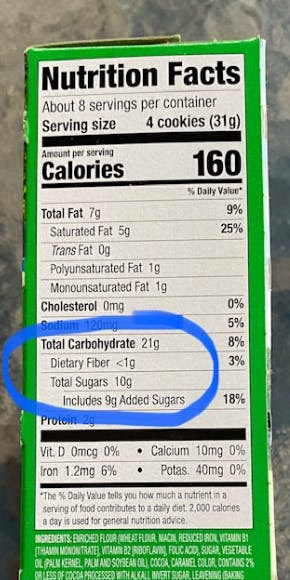
When looking at the label, you can see how much sugar has been added in processing.
Total sugars = naturally occurring + added sugars.
Underneath the total is Includes x grams of added sugars
In the above example, there is 10g of total sugar, and 9g is from added sugar.
It is not necessary to cut out ALL added sugar.
Think of having an “added sugar” budget. Just like you would with money, choose wisely how you spend it. Everyone gets to decide how they want to do it.
For me, I like brown sugar on oatmeal with raisins and nuts. A little brown sugar really enhances the flavor of this healthy dish, and it reminds me of how Mama made it.
I also love chocolate, pie, and brownies (which are the opposite of nutrient-dense). I occasionally use my budgeted added sugar amount on an indulgent sweet. On the other hand. I don’t feel that “regular” sugar sweetened soft drinks are “worth” the extra calories. I have eliminated them completely from my diet. (If you eliminate one 12-oz can of sugar sweetened soft drink per day, you’re looking at reducing your intake by 980 calories per week).
Which brings me to…
Sugar substitutes, low calorie sweeteners or nonnutritive sweeteners.
All these terms mean the same thing. Some people who want a sweet taste without the added sugar or calories use diet drinks and sugar substitutes. There are many types and all are safe to use. There is a huge amount of misinformation about these sweeteners. In fact, there is no scientific evidence that they cause any problems.
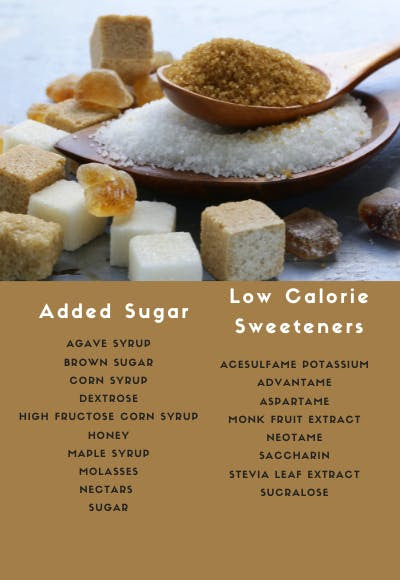
Sugar Alcohol is another type of sweetener used in products. It is a confusing name because it is not sugar or alcohol. Another name for sugar alcohol is polyol. This sweetener is a type of carbohydrate and therefore listed under total carbohydrate on the food label. It is not completely digested and has less impact on glucose. It may also cause gas or bloating. Some people are more sensitive than others. Eating a whole bag of sugar free cookies thinking they are “free” might have more consequences than inferior flavor.
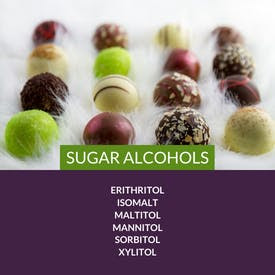
So to Recap…
Eat healthy foods and do not be concerned about naturally occurring sugar in fruit, milk, and yogurt. (If you have diabetes, these are a healthy way to get your carbohydrate).
Limit added sugar, especially if you are concerned about heart disease, diabetes, or overweight/obesity. When you do decide to indulge, choose what you really love.
Sugar substitutes are safe and can provide a sweet taste without added sugar.
Look for the added sugar on Nutrition Facts panel to help you decide what products are right for you.
And finally, remember that while weight loss and controlling your diabetes may be difficult, it is easier if you have a trained professional helping you. Please get in touch so I can help you be the best you!
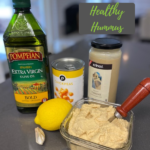

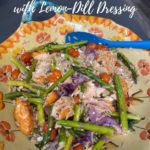

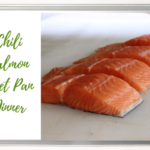
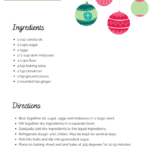
Leave a Reply